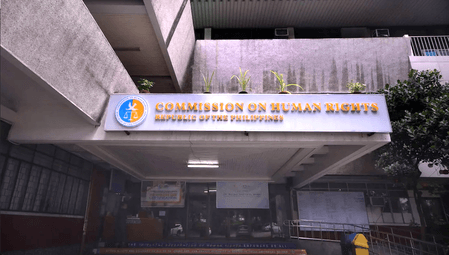
Upgrade to High-Speed Internet for only ₱1499/month!
Enjoy up to 100 Mbps fiber broadband, perfect for browsing, streaming, and gaming.
Visit Suniway.ph to learn
This is AI generated summarization, which may have errors. For context, always refer to the full article.

RED-TAGGED. Cagayan de Oro-based journalist Cong Corrales (2nd right) files a complaint against Meta at the National Privacy Commission, on May 5, 2023. Corrales is seeking to compel Meta to disclose information about anonymous accounts that red-tagged him on Facebook. He is accompanied by Atty. Tony La Viña and Atty. Rico Domingo of the Movement Against Disinformation.
Angie de Silva/Rappler
The list includes the spouse of a famous social media influencer and a government institution
CAGAYAN DE ORO, Philippines – An anti-disinformation group has secured a list of some of those allegedly behind the systematic red-tagging attacks against a Cagayan de Oro-based journalist, including the spouse of a famous social media influencer and a government institution.
Following an arbitration facilitated by the National Privacy Commission (NPC), the Movement Against Disinformation (MAD) obtained internet service provider data and the identities of at least 10 of around 30 social media page administrators allegedly involved in red-tagging Leonardo Vicente “Cong” Corrales, editor-in-chief of the Mindanao Gold Star Daily.
One account was reportedly traced to a government establishment in Cagayan de Oro.
“This is just the first step towards achieving complete relief and justice,” MAD said in a statement on Wednesday, July 16.
“This advocacy is especially vital considering the odious impact and chilling effect that red-tagging has on the work of journalists in delivering news to the public,” said the advocacy group led by lawyers Rico Domingo and Antonio La Viña.
The development came two years after Corrales filed a complaint against Facebook owner Meta Platforms Incorporated before the NPC, seeking to compel the company to disclose information about the anonymous Facebook accounts allegedly behind the online harassment.
In his May 5, 2023 complaint, Corrales sought P10 million in nominal damages, P5 million in moral damages, and P5 million in exemplary damages.
Corrales, 51, is the most red-tagged journalist in Cagayan de Oro. He and his family suffered mental and emotional anguish as a result, and security concerns even forced the journalist to flee his home city at one point.
The journalist has been subjected to repeated red-tagging for years, especially during the Duterte administration.
Before he filed the 2023 complaint, memes, leaflets, and posters again circulated in Cagayan de Oro linking him to communist rebels. One image showed him holding an Airsoft toy gun used during a 2010 journalist safety training, presented in a way to suggest he was an armed rebel.
His wife and children were not spared, and were also red-tagged. They were labeled a “family of communists.”
Corrales experienced some of the worst online attacks in April 2021 during the COVID-19 lockdown after reporting on a community pantry initiative in Barangay Kauswagan, Cagayan de Oro. He was accused of being a propagandist for the pantry’s organizer, a University of the Philippines physics instructor who was also red-tagged. The pantry shut down almost as soon as the wave of red-tagging began.
Corrales welcomed the legal breakthrough. “Now, we can go after these people,” he said.
He said he was grateful to lawyers and MAD for bringing him “a step closer to holding to account the cowardly organizations and individuals who resort to red-tagging to stifle the free and independent press.”
For years, the Cagayan de Oro Press Club (COPC) and the National Union of Journalists of the Philippines (NUJP) condemned the attacks and have repeatedly called for accountability. Corrales currently serves as one of the COPC’s directors and is a former NUJP national director.
Much like McCarthyism in the United States in the 1950s, red-tagging — falsely labeling individuals as communist sympathizers or terrorists — has been widely used in the Philippines, exposing journalists, activists, and government critics to harassment, threats, surveillance, arbitrary arrest, and even killings.
In 2024, the Supreme Court ruled that red-tagging threatens an individual’s constitutional rights to life, liberty, and security. The court defined the practice as the use of threats and intimidation to deter alleged subversive activities, with risks of abduction or killing.
The high tribunal’s ruling strengthened legal protections for victims and directed lower courts not to dismiss petitions for a writ of amparo — legal remedies for threats to life and liberty — without proper hearing.
MAD said it would pursue “watershed litigation” to hold those behind the red-tagging accountable, especially on social media. – Rappler.com

 1 day ago
3
1 day ago
3

![[Pastilan] ‘Badoyistic Parladeism’ and mutations in the AFP](https://www.rappler.com/tachyon/2021/05/TL-Badoyistic-Parladeism-1280.png?fit=449%2C449)


![[OPINION] Waiting for the real Philippine opposition](https://www.rappler.com/tachyon/2025/07/TL-REAL-PHILIPPINE-OPPOSITION-JULY-18-2025.jpg)
